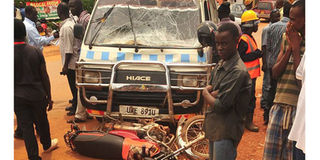Boda boda crashes crippling Kampala

An accident scene involving a boda boda and taxi in Namugongo, Wakiso District, last year. File Photo
What you need to know:
- Data at the Department of Traffic Police indicates that of the 7,000 people killed in boda boda accidents between 2015 and 2017 in Uganda, more than 60 per cent (4,200) of the deaths were recorded in Kampala, Wakiso and Mukono districts.
- Police have launched a crackdown on errant riders because of the rising numbers of boda boda accidents. He says they have deployed overt and covert officers because riders easily spot uniformed officers and use all means to evade arrest.
- Mr Peter Kaujju, the KCCA head of public and corporate affairs, says there is a bigger plan by the authority and the Works ministry to regulate the boda boda business.
When you visit police stations in Kampala Metropolitan area, a sight of several boda boda motorcycles parked at the stations is common.
Many of these have been involved in accidents where several pedestrians have been killed and others injured after the riders ram into moving vehicles.
Data at the Department of Traffic Police indicates that of the 7,000 people killed in boda boda accidents between 2015 and 2017 in Uganda, more than 60 per cent (4,200) of the deaths were recorded in Kampala, Wakiso and Mukono districts.
Police say every month, they record more than 300 serious accidents, 500 minor ones and close to 100 fatalities, all resulting from reckless riding.
Figures indicate that of the 24,352 motorcyclists, passengers and pedestrians seriously injured in such accidents in the last three years, 16,000 were in Kampala.
Prevalence
“Every year, boda boda accidents in Kampala top our traffic data. Boda boda riders are killing and injuring passengers and pedestrians every day. We have realised most of these riders lack experience, training and many of them ride while drunk,” a senior officer at traffic data office said on condition of anonymity.
Kampala Metropolitan traffic operations commander Julius Luyima, says every day, they register 10 accidents; 15 minor and three fatalities.
Mr Luyima identifies the accident hotspots as Kibuye roundabout, Clock Tower, Jinja Road junction and Katwe, near Usafi Market. He says several bodies of riders and passengers are often picked up at Shell fuel station, opposite Shoprite, because most motorcyclists and their passengers are usually knocked dead there as they ride from Nakasero Market, Jinja Road, Kampala Road and Megha Standard plaza from where they join the Shoprite junction.
“Another spot where we often pick people killed in boda boda accidents is the Usafi, Mengo and Kisenyi junction. Motorcyclists from Entebbe Road and Mengo ride as if they own the road,” Mr Luyima says.
He attributes the increasing boda boda accidents to a number of factors, among others unemployment where many youth have ventured into the boda boda industry without formal training.
“Someone wakes up in the morning and asks a friend or relative to buy him a boda boda for a living. They don’t mind about going through training but their main aim is to get money for survival. Most of these riders involved in accidents don’t have riding permits and are new riders on Kampala roads,” Mr Luyima explains.
The traffic commander adds that police have launched a crackdown on errant riders because of the rising numbers of boda boda accidents. He says they have deployed overt and covert officers because riders easily spot uniformed officers and use all means to evade arrest.
However, Mr Kanyike Kiviri, the chairman Kampala Metropolitan Central Boda Boda Association, blames police for the rising accidents.
Blame-game
“Many of our colleagues have been injured or knocked dead while trying to dodge police, which arrests them even when they present documents such as riding licenses and helmets. At every junction, there are uniformed and plain clothed traffic officers, which forces us to ride on tension. You do not know who will arrest you or not,” Mr Kiviri asserts.
Police say they arrest 30 to 70 riders every day but some of them get released before going to court, especially those arrested over the weekend. Police explain that the riders are often reckless; riding on pavements or from opposite sides on one-way routes and making unnecessary turns.
“We launch operations whenever we see overwhelming numbers of accidents involving boda boda riders. We realise all these accidents result from reckless riding and we come out to stop it,” Mr Luyima says.
Mr Luyima adds that accidents involving boda boda cyclists have started going down ever since they launched an operations against all riders without the necessary requirements. Mr Kiviri calls upon police to focus on sensitising riders but also help them acquire permits at a fair cost. He says this could reduce accidents as riders would have no reason to dodge police.
“We request police to accept that a boda boda rider cannot have all the requirements in one day. If someone has a permit, then he should not be arrested for not having a helmet. They should stop arresting our colleagues even when they have permits and third party insurance,” he says.
GOVT PLAN
Mr Peter Kaujju, the KCCA head of public and corporate affairs, says there is a bigger plan by the authority and the Works ministry to regulate the boda boda business. “The government, through the relevant ministries and KCCA, are developing a plan to regulate boda boda business in Kampala. I cannot give details but what I know is that it would include having a limited number of boda bodas and strict guidelines,” he said.



